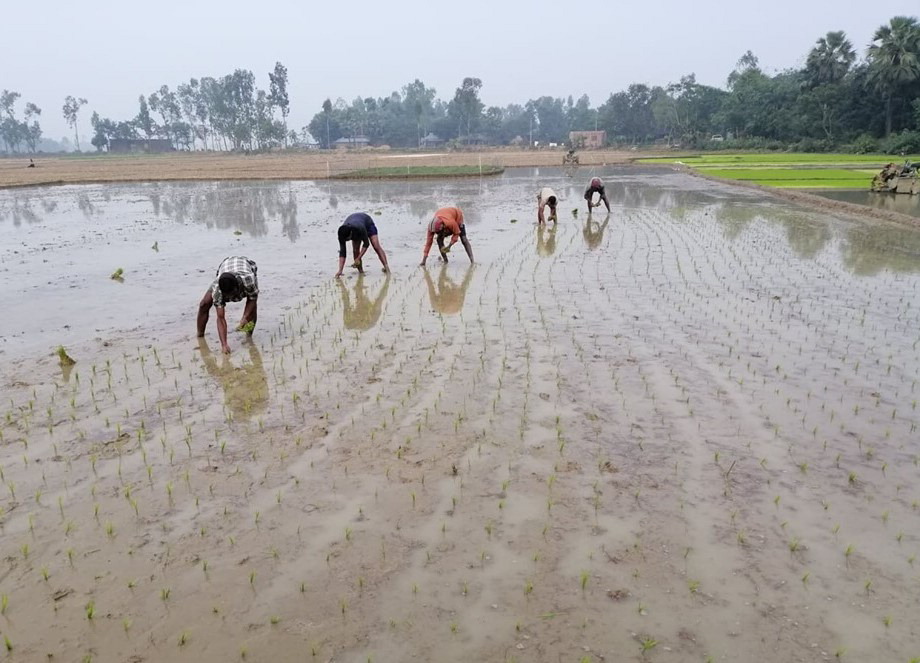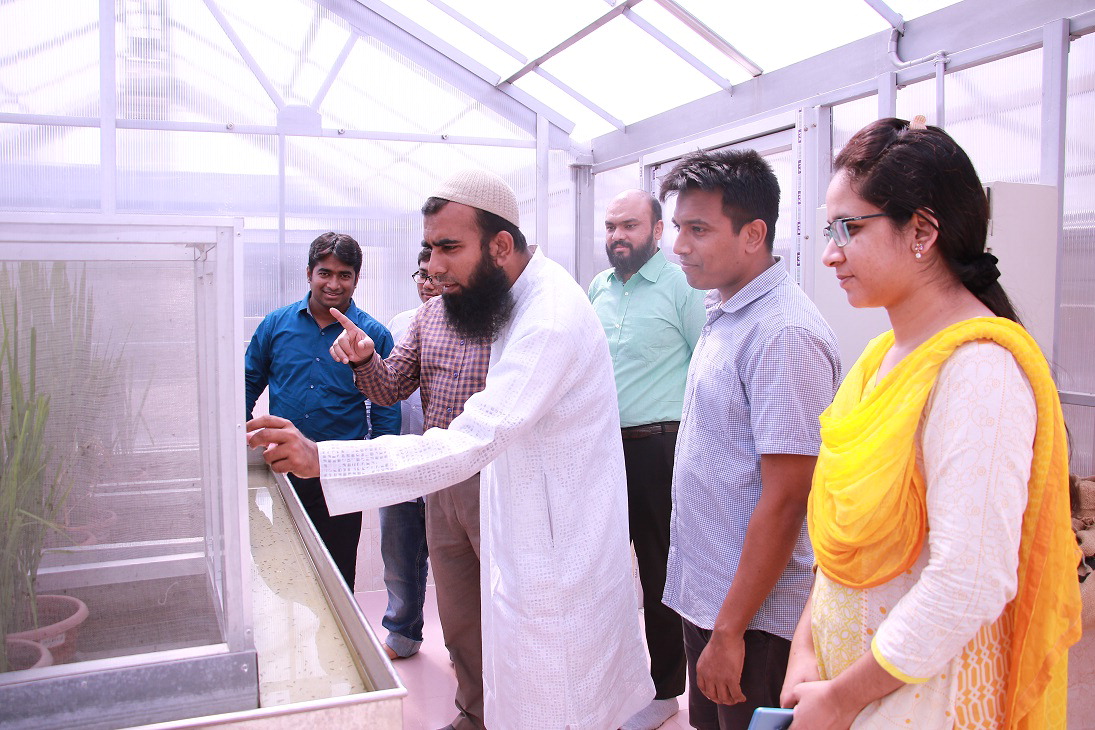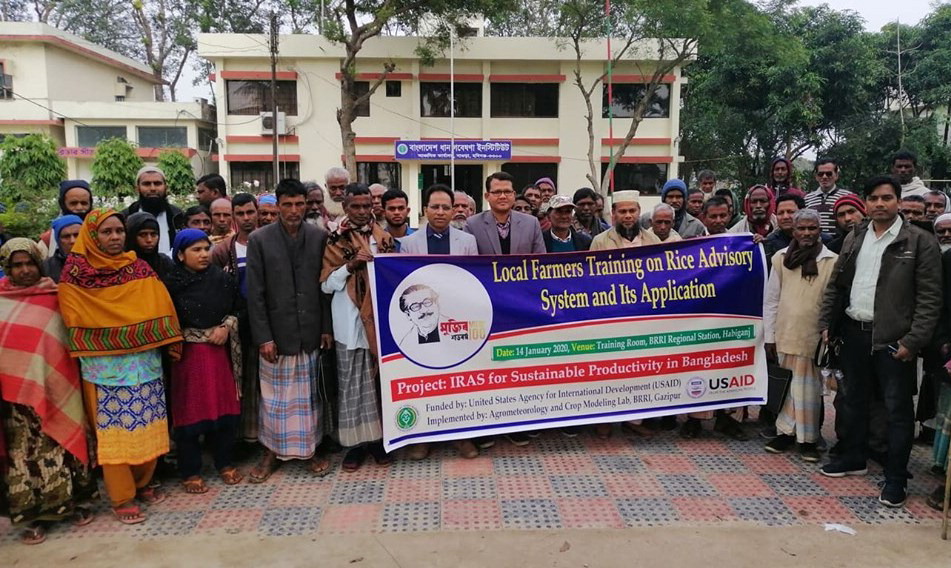One of the major components of increasing rice yield is efficient crop management, but in Bangladesh, weather variability is a crucial hindrance to ensuring better management. This PEER project is built upon ongoing research on forecast-based rice crop management at the Agromet and Crop Modeling Lab of Bangladesh Rice Research Institute. With mentorship from his U.S. partner Dr. Faisal Hossain and his group at the University of Washington, Dr. Rahman and his team sought to develop an integrated framework for agro-meteorological advisory services for rice crops in Bangladesh. To this end, the PI and his colleagues developed a Web-based platform, “Integrated Rice Advisory System (IRAS),” to provide extension workers and rice farmers with agro-meteorological advisories for effective decision-making.
With almost 16.5 million farmers in Bangladesh, the team's target is to provide weather-based advisory to all interested farmers once a week on a regional basis. The researchers mapped the sensitivity of rice crops in specific areas to certain weather conditions to understand how the weather in general will influence the growth of rice. The team then used the open-source Weather Research and Forecast (WRF) model for generating location-specific weather forecasts and automated it within the IRAS.
The project also helped validate BRRI’s previous research on forecast-based rice crop management with the participation of volunteer farmers from four districts. Farmers and extension workers in the target locations were trained to utilize the advisories generated through IRAS and apply them during the rice season at pilot fields. The U.S. partner provided valuable R&D support and technical guidance on systems integration for IRAS.
Final Summary of Project ActivitiesThe PEER team developed IRAS as a web-based platform that generates location-specific weather forecasts, capable of consolidating advisories with input from researchers for different locations and considers growth stages of rice varieties. The platform has been developed only for rice crops and combines expertise from Bangladesh Meteorological Department, the Bangladesh Rice Research Institute, and the Department of Agricultural Extension. The platform automatically runs the Weather and Research Forecasting (WRF) model every day, generates location-specific weather forecasts, and visualizes its graphical and tabular results, generating advisories that are emailed to extension officials and farmers.
,
The researchers also conducted field experiments in several locations during the 2019-2020 and 2020-2021 Boro rice season using popular and high-yielding rice varieties. Farmers’ land was used for both forecast-based management and traditional management. The team shared its location-specific advisories, and the farmers implemented those advisories for day-to-day farm decision-making under the supervision of the BRRI regional stations and extension workers. The researchers collected a wide variety of data on the crops grown, including grain yield, weight, maturity date, and plant height, as well as climate data like temperature, rainfall, etc.
The team members made frequent field visits during the experiment and conducted five training workshops for farmers. The project involved strong collaboration with government agencies like the Bangladesh Meteorological Department (BMD), the Flash Flood Warning Center (FFWC), the Department of Agricultural Extension (DAE), and the international NGO Regional Integrated Multi Hazard and Early Warning System (RIMES).
The team’s study showed positive and significant improvements on yield and grain weight for forecast-based management crops. Different rice varieties had different yield improvements, but generally a 7-10% increase was observed. The team theorized that this might be attributed to the function of the application of fertilizer to the field and optimal irrigation use based on the forecast model. Their research also found that implementing weather forecasting-based management could lower production costs by 15% and increase total income by more than 30%.
PublicationNiaz Md. Farhat Rahman, Waqas Ahmed Malik, Md. Azizul Baten, Md. Shahjahan Kabir, Mohammad Chhiddikur Rahman, Rokib Ahmed, A.B.M. Zahid Hossain, Md. Mofazzel Hossain, Tuhin Halder, Md. Khairul Alam Bhuiyan, Mohammad Ashik Iqbal Khan, Raihanul Haque Khan, Nazmul Ahasan, and Hans-Peter Piepho. 2024. Sustaining rice productivity through weather-resilient agricultural practices.
Journal of the Science of Food and Agriculture 2024 Mar 15;104(4):2303-2313.
https://doi.org/10.1002/jsfa.13119 





